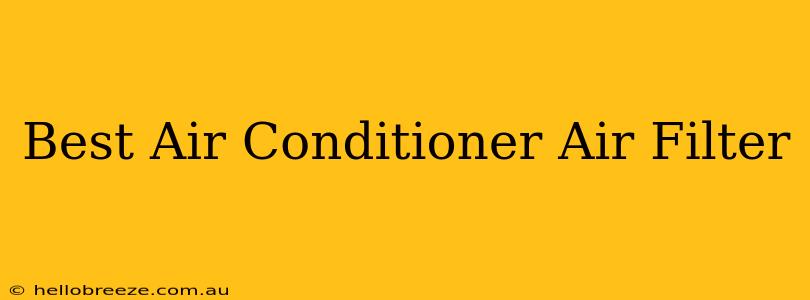Choosing the right air conditioner air filter can significantly impact your comfort and indoor air quality. A clean filter ensures efficient cooling, prevents dust and allergens from circulating, and extends the lifespan of your AC unit. But with so many options available, finding the best air conditioner air filter can feel overwhelming. This guide will help you navigate the choices and select the perfect filter for your needs.
Understanding Air Conditioner Air Filters
Air conditioner filters are crucial for trapping dust, pollen, pet dander, mold spores, and other airborne particles. They prevent these contaminants from entering your home's air circulation system, leading to cleaner air and a healthier living environment. Different filters offer varying levels of filtration, each with its own pros and cons.
Types of Air Conditioner Air Filters
-
Fiberglass Filters: These are the most common and inexpensive type. They're effective at removing larger particles but offer minimal filtration for smaller allergens. They need frequent replacement, typically every 30-60 days.
-
Pleated Filters: These filters offer a larger surface area than fiberglass filters, leading to better filtration and a longer lifespan (often 90-180 days). They're more efficient at trapping smaller particles than fiberglass filters.
-
HEPA Filters (High-Efficiency Particulate Air): These are the top performers, removing up to 99.97% of particles 0.3 microns in size. HEPA filters are ideal for allergy sufferers and those seeking superior air purification. However, they are more expensive and require less frequent replacement.
-
Electrostatic Filters: These filters use electrostatic charges to attract and trap particles. They often have a longer lifespan than fiberglass or pleated filters and offer good filtration efficiency.
-
Activated Carbon Filters: While not directly related to particle filtration, these filters absorb odors and gases, improving the overall air quality. They're often combined with other filter types.
Factors to Consider When Choosing an Air Conditioner Air Filter
Several factors influence the best air conditioner air filter for your specific needs:
-
Your AC Unit's Requirements: Always check your air conditioner's manual for recommendations on the appropriate filter size and type. Using the wrong filter can damage your unit.
-
Your Indoor Air Quality Needs: If you have allergies or sensitivities, a HEPA filter or a high-efficiency pleated filter is recommended. For general dust and debris removal, a pleated filter might suffice.
-
Your Budget: HEPA filters are generally more expensive than fiberglass or pleated filters. Consider your budget and the level of filtration you require.
-
Maintenance: Regular filter replacement is crucial for maintaining efficiency and preventing damage to your AC unit. Choose a filter that fits your maintenance schedule.
Finding the Best Air Conditioner Air Filter for Your Home
The "best" filter is highly dependent on individual needs and preferences. However, by understanding the various types and factors discussed above, you can make an informed decision. Prioritize your air quality needs and your AC unit's requirements when making your selection. Remember to always replace your filter according to the manufacturer's recommendations or when it becomes visibly dirty.
Maintaining Your Air Conditioner and Filter
Regular maintenance is key to prolonging the life of your AC unit and ensuring optimal performance. This includes:
-
Regular Filter Changes: Change your air filter as frequently as recommended by the manufacturer. A dirty filter restricts airflow, reduces efficiency, and can damage your AC unit.
-
Professional Maintenance: Schedule annual professional maintenance checks to ensure your AC unit is operating efficiently and to identify any potential problems.
By choosing the right air conditioner air filter and following proper maintenance practices, you can enjoy clean, comfortable air and extend the life of your valuable air conditioning system. Investing in the right filter is an investment in your health and the longevity of your equipment.

